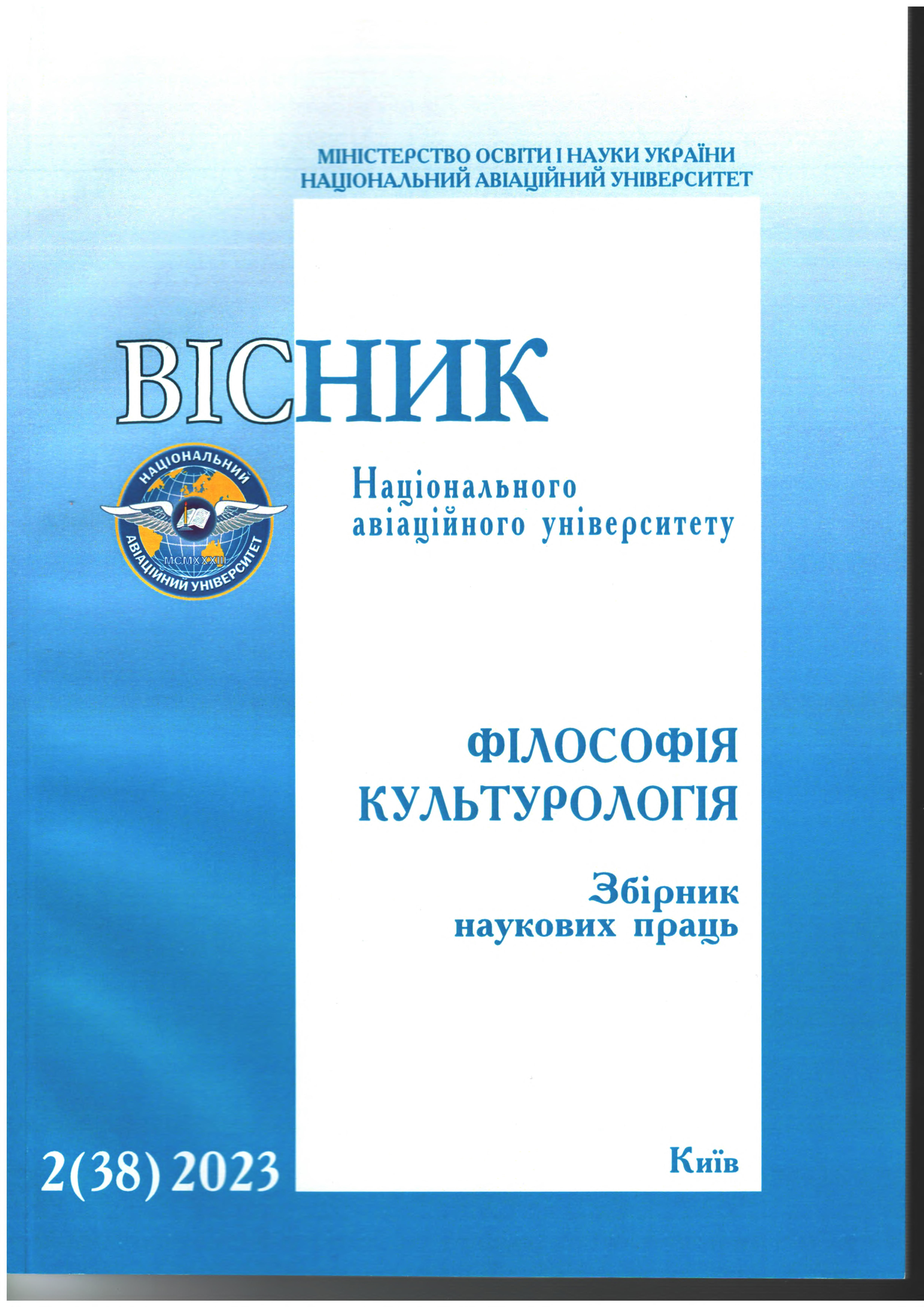MORAL AND ETHICAL DIMENSIONS OF SOCIAL COMMUNICATIONS (LINGUISTIC CONTEXT)
DOI:
https://doi.org/10.18372/2412-2157.2.18109Keywords:
language of communication, moral consciousness, religious consciousness, moral and ethical norms, traditions, ethics, morality, social communication, models of language-communication relations, harmony, humanism, social developmentAbstract
Introduction. The concept of morality, moral and ethical norms is a component of social-communicative relations, a part of the spiritual sphere. Any communication act is based on a certain system of values, moral principles. Тhere is a transformation of the role and meaning of language and communication ties in society needed to be studied. The aim of the article is to consider the philosophical aspects of the interrelationship of the moral-ethical component of social-communicative relations and the linguistic context as a way of their implementation as an element of the social system in the context of current social challenges. Research methods are the theoretical basis of the dialectical approach in terms of the analysis of the nature of contradictions and ways of solving them, and ethics in the interpretation of moral consciousness as a subject - subject relations, the interaction of different levels of moral consciousness, the principles of the systemic approach. Research results. The modern stage of the development of the value system is undergoing transformations that consist, on the one hand, in a departure from moral ideas and pragmatic and scientific thinking, an increase in the importance of the internal problems of individual human existence based on various existentialist and personalist ideas with a noticeable influence of pessimistic forms of worldview. On the other hand, we can observe a growing dualistic gap between the actual state of social morality at the everyday-practical level of moral consciousness and its theoretical-systemic level, which formulates the main principles of abstract moral obligation. Discussion. The formation of a complementary model of language-communicative social relations in the conditions of the transformation of the language environment as a means of communication is based on the key provisions of the unity of opposites and contradictions from the point of view of the presence of positive potential for development. Conclusion. Тhe modern moral and ethical component of social communications is a certain spiritual system that includes basic and related categories of ethics. The constructive side of moral and ethical aspects of modern socio-communicative relations consists in the manifestation of features of humanitarianism and solidarity with respect to the observance of general principles of individual and collective behavior.
References
Головаха Є. І. Патологія посттоталітарного суспільства: від психіатричного самодіагнозу до аналізу специфічних соціопатій.
Філософська і соціологічна думка. 1993. № 5. С. 19–39.
Дротянко Л. Г. Комунікації в соціальних мережах і феномен мультикультуралізму. Вісник Національного авіаційного
університету. (Серія «Філософія. Культурологія»). 2019. № 1 (29). С. 16-21. DOI: https://doi.org/10.18372/2412-2157.29.13885
Єрмоленко А. М. Дискурс. Комунікація. Моральність. К.: Наукова думка, 2021. 438 с.
Людина і культура / за ред. Д. Шевчука. Острог: Видавництво Національного університету «Острозька академія», 2019. 224 с.
DOI 10.25264/978-617-7328-73-4
Моральні виклики сучасного світу, 2014. URL: http:// www.etica.in.ua/moral-ni-vikliki-suchasnogo-svitu/.
Петренко М. О. Сучасні морально-етичні виклики: соціокультурні засади та філософські дискурси. Актуальні проблеми філософії та соціології : Науково-практичний журнал. Голов. ред. С. Г. Секундант, відпов. ред. Д. В. Яковлев ; Міністерство освіти і науки України ; Національний університет "Одеська юридична академія". Одеса, 2021. Вип. 33. С. 44-49. DOI https://doi.org/10.32837/apfs.v0i33.1057
Cитніченко Л. До проблеми моральних засад справедливого суспільства: виклики постмодерну. Соціокультурні та теоретичні
засади постмодерну. Київ : Інститут філософії НАН України, 2017. С. 243–309.
Стеблина Н. О. Етика у сфері соціальних комунікацій (професійні стандарти у журналістиці, рекламі та PR): Навчально-
методичний посібник. Львів: ПАІС, 2014. 228 с.
Сухова Н. М. Цифрова реальність: нові умови для людства. Вісник Національного авіаційного університету. (Серія
«Філософія. Культурологія»). 2021. № 1 (33). С. 150-154. DOI: https://doi.org/10.18372/2412-2157.33.15662
Тейлор Чарльз. Етика автентичності. К.: Дух і літера, 2002. 128 с.
Тофтул М. Г. Сучасний словник з етики: Словник. Житомир: Вид-во ЖДУ ім. І. Франка, 2014. 416 с.
Фукуяма Ф. Ідентичність. Потреба в гідності і політика скривдженості. Київ: Наш формат, 2020. 192 с.
Халик Т. «Витіснений» Бог. Про духовну ситуацію в посткомуністичному суспільстві. Людина і світ. 1999. № 11-
С. 3–8.
Ченбай Н. А. Проблема кризи духовності в контексті нових цивілізаційних викликів. Вісник Національного авіаційного
університету. (Серія «Філософія. Культурологія»). 2022. № 2 (36). С. 130-133. DOI: https://doi.org/10.18372/2412-2157.36.16987
Четверікова Л. Соціальна етика як елемент структури соціальної держави. Наук. вісн. Серія: Політологія. Соціологія.
Філософія. Ужгород. нац. ун-т. Ужгород, 2005. Вип. 2. С. 22–28. URL: https://dspace.uzhnu.edu.ua/jspui/handle/lib/17762.

